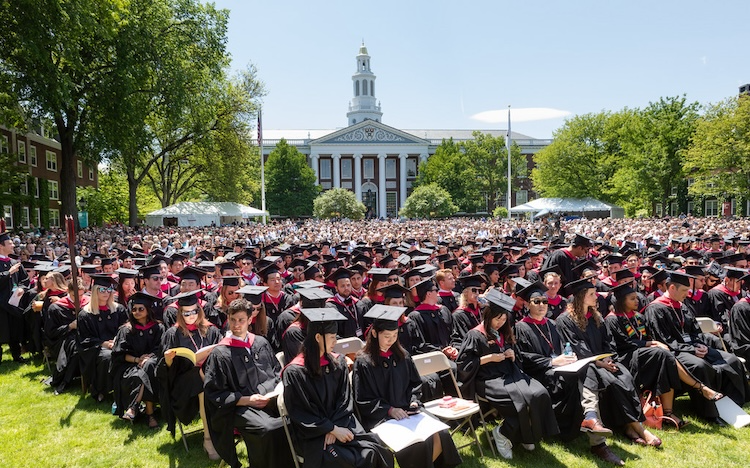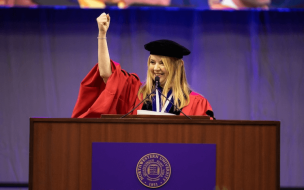Effective from the class of 2025 onwards, this decision reflects recent changes to the curriculum that emphasize quantitative and analytical ability.
The program now includes a data science and artificial intelligence for leaders course in the first-year Required Curriculum (RC), and management science content in the second-year Elective Curriculum (EC).
“This change will enable all students, particularly our international students, to pursue the opportunities a STEM-eligible degree affords,” said Jana Pompadur Kierstead, executive director of MBA and Doctoral Programs and External Relations at HBS, in an announcement on the school's website.
Why are STEM MBA programs on the rise at M7 schools?
With this decision, Harvard joins other M7 business schools that have already embraced STEM designations.
Stanford Graduate School of Business (GSB), University of Chicago Booth School of Business, Northwestern University Kellogg School of Management, MIT Sloan School of Management, and Columbia Business School have long offered full-time STEM MBA programs. Meanwhile, The Wharton School offers several STEM majors within its MBA program, such as Business Analytics and Quantitative Finance.
MBA admissions consultant and expert Barbara Coward believes the decision may be driven by the ongoing competition between Harvard and Stanford.
“The HBS brand is associated with case-study learning whereas GSB is well-known for its unrivaled proximity to Silicon Valley among top business schools. By adding a stronger focus on quantitative and analytical skills, HBS appears more hip and cutting edge, and is more likely to convert more dual applicants to HBS and GSB,” she explains.
The new STEM designation is just one of many recent updates to the Harvard MBA program.
“[HBS] see technology as a core business topic, which can also be seen from their introduction of the MS/MBA program years ago, in which students earn an MS in Computer Science,” says David White, founding partner of admissions consultancy Menlo Coaching.
Several electives that emphasize quantitative and analytical ability have since been included in the MBA program. Recent popular options include Generative AI for Business Leaders, Data Visualization for Analysis, and Communication and Supply Chain Analytics.
The growing need for STEM skills in business
The rise of STEM-designated MBA programs reflects the growing need for business school graduates with quantitative skills entering the workforce.
“What the world’s businesses need from their leaders evolves,” wrote Matt Weinzierl, Joseph and Jacqueline Elbling professor of Business Administration and senior associate dean and chair of the MBA Program, in the announcement.
“Increasingly, those leaders are being asked to utilize management science when making tough decisions. Our faculty recognized this evolution and have created and integrated into their teaching cutting-edge, compelling content to ensure that our students are equipped to lead with these new tools. The formal STEM designation is in acknowledgement of this fundamental shift and opens up new avenues for our graduates.”
Graduates with a STEM-designated MBA are particularly attractive in the current climate. According to the US Bureau of Labor Statistics, STEM careers are projected to grow by nearly 11% between 2022 and 2032, compared to just 2.3% for non-STEM fields.
While career opportunities and salaries in STEM differ across the country, the demand for STEM expertise remains high.
How does this impact international students?
STEM designation is particularly attractive to international students, as it allows them to extend their stay in the US through the Optional Practical Training (OPT) program.
For most international students in the US, an F-1 student visa allows them to remain in the country for just one year after graduation. Via the OPT program, international STEM graduates with F-1 status can extend this by an additional 24 months, allowing them to work in the US for up to three years post-graduation.
“An ongoing challenge for applicants is the anxiety that comes with the high cost of tuition and uncertainty around post-MBA jobs,” Barbara explains.
“For international applicants, this worry is amplified by immigration policies in the US.[…] The addition of a course on data science and artificial intelligence in the first-year curriculum, and more management science content in the second-year curriculum, not only better equips all students for jobs in the economy but enables international students to stay longer in the United States to pursue post-graduation opportunities.”
This news aligns with broader efforts to retain STEM graduates in the US, such as the recently proposed Keep STEM Graduates in America Act, which aims to simplify the visa process for STEM graduates and increase the retention of foreign talent in the US.








